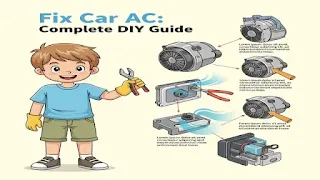🛠️ Fix Car AC: Complete DIY Guide
A malfunctioning car AC turns every drive into a nightmare. Master professional repair techniques, cost-saving hacks, and critical maintenance strategies in this ultimate handbook.
🔍 Common AC Failure Causes
1) Refrigerant leaks: 58% of AC failures stem from leaks in hoses/O-rings
2) Compressor failures: Worn clutches cause 22% of breakdowns
3) Electrical issues: Blown fuses or faulty relays disrupt 15% of systems
4) Clogged condensers: Road debris reduces cooling efficiency by 40%
Step 1: System Diagnosis
Use manifold gauges to check pressures:
- Low side: 25-45 PSI
- High side: 150-250 PSI
Abnormal readings indicate leaks or component failures
❄️ Refrigerant Handling
- Always use R-134a/R-1234yf specified for your vehicle
- Never mix refrigerant types
- Recover old gas before recharging
🔧 Repair Protocol
1) Leak detection: Apply UV dye + black light
2) Component replacement: Use OEM parts for compressors/condensers
3) System evacuation: Run vacuum pump for 45+ minutes
4) Recharge: Add refrigerant by weight, not pressure
Tool Checklist
- Manifold gauge set ($80-$200)
- Vacuum pump ($150-$400)
- Electronic leak detector ($60-$300)
- Safety goggles & gloves
⚠️ Safety First
- Never open pressurized systems
- Avoid skin contact with refrigerant
- Work in ventilated areas
💸 Cost Analysis
- Compressor replacement: $800-$1,400
- Condenser repair: $450-$900
- Evaporator fix: $600-$1,200
- DIY recharge kit: $50-$150
Maintenance Schedule
- Monthly: Check clutch engagement
- Annual: Clean condenser fins
- Biannual: Replace cabin filter
- 5 Years: Full system flush
🌡️ Temperature Test
Properly functioning AC should output air at 15-20°F below ambient temperature at vents
Keep emergency refrigerant sealant in trunk. Run AC weekly year-round. Remember: 90% of failures start with ignored weak cooling!


Leave a comment